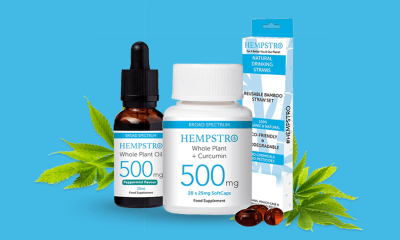LIFESTYLE
CBD 101: The anti-inflammatory properties of CBD explained
Gregor Zorn is a medical cannabis consultant, educator and researcher. Here, the co-founder of the European Cannabinoid Therapy Association (ECTA) and one of the instructors at the first European Medicinal Cannabis post-graduate educational course explains the anti-inflammatory powers of CBD.
CBD is becoming very popular due to its many therapeutic properties and non-intoxicating nature. Besides its antioxidant, antibiotic, neuroprotective, anxiolytic, and anticonvulsant properties, CBD also has high anti-inflammatory activity.
Gregor Zorn explains why this makes it incredibly useful, as inflammation is present in a wide variety of different medical conditions.
What is inflammation?
Inflammation is an important mechanism of the immune system, that protects our body and increases healing. We can divide inflammation into acute and chronic.
Acute inflammation is beneficial – its onset is rapid and lasts only for a short period of time. It works to isolate the damaged area, to mobilise protective cells and molecules to the damaged site, and to promote the removal of damaged tissues.
If acute inflammation persists for a longer period of time, then we talk about chronic inflammation. It can also be caused by nondegradable pathogens, viral infections, persistent foreign bodies, or an autoimmune reaction. Chronic inflammation can last for months or even years, causing cell damage and tissue destruction.
Chronic inflammation and diseases
There is increasing evidence that chronic inflammation can also cause many chronic diseases, such as obesity, diabetes, inflammatory bowel disease, Parkinson’s disease, Alzheimer’s disease, and schizophrenia.
It is also estimated that about 15–20% of all cancer cases are preceded by chronic inflammation, including lung, colon and pancreatic cancers. It becomes very clear, that reducing or preventing chronic inflammation is something most of us should be actively doing.
The anti-inflammatory mechanisms of CBD
CBD can interact with a wide variety of a molecular targets in our body. Its anti-inflammatory effect is mediated by interacting with different receptors (cannabinoid, adenosine, GPR55), ion channels (TRPV1) and enzymes (lipoxygenase, cyclooxygenase-2).
CBD interacts directly with specific immune cells, supressing the production of proinflammatory compounds and increasing the levels of anti-inflammatory compounds. These effects, in conjunction with its other therapeutic effects, make CBD a very effective compound in inflammatory processes.
Other anti-inflammatory phytocannabinoids
CBD is not the only cannabis constituent that has anti-inflammatory effects. Other phytocannabinoids, such as THC, cannabinol, their acidic precursors, tetrahydrocannabinolic acid and cannabidiolic acid, as well as terpenes (D-limonene, β-caryophyllene, α-pinene) have all shown anti-inflammatory activity.
An interesting observation is that when these compounds are taken together, as whole plant extracts, they potentiate the therapeutic effects of the single compounds, making them more efficacious and needing lower doses to achieve the same effects.
The verdict
Studies, as well as consumer experiences, are showing the beneficial therapeutic effects CBD can have. As inflammation is present in our daily lives, it is a good idea to add CBD and other anti-inflammatory compounds to our daily regime, as a preventive measure or as a more focused therapy.

About the author
Gregor Zorn is medical cannabis consultant, educator and researcher. His main area of interest is practical implementation of phytocannabinoid therapies for specific medical conditions. He is an international speaker specialised in teaching medical professionals, patients and students, about all aspects of cannabinoids and their important role in health and disease
He is the co-founder of the European Cannabinoid Therapy Association (ECTA) and one of the teachers at the first European Medicinal Cannabis post-graduate educational course, at Padua University Medical School in Italy. He is a teacher at the Masterclass Medicinal Cannabis, a member of the International Association for Cannabinoid Medicines (IACM) and a founding member, author and scientific advisor to Zbudimo.se.
This article was originally written by Gregor Zorn in 2019 for The CANNAVIST issue four print edition.










